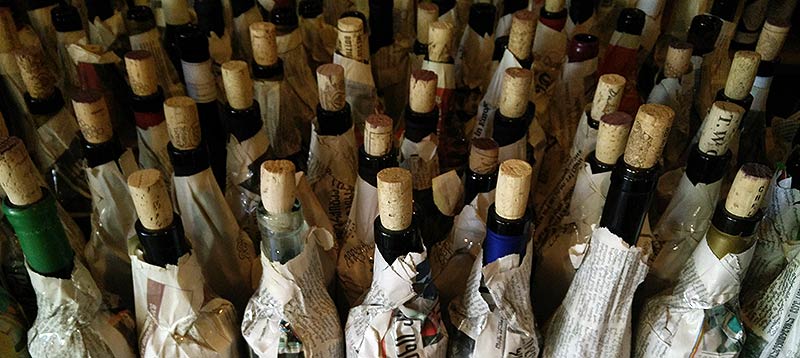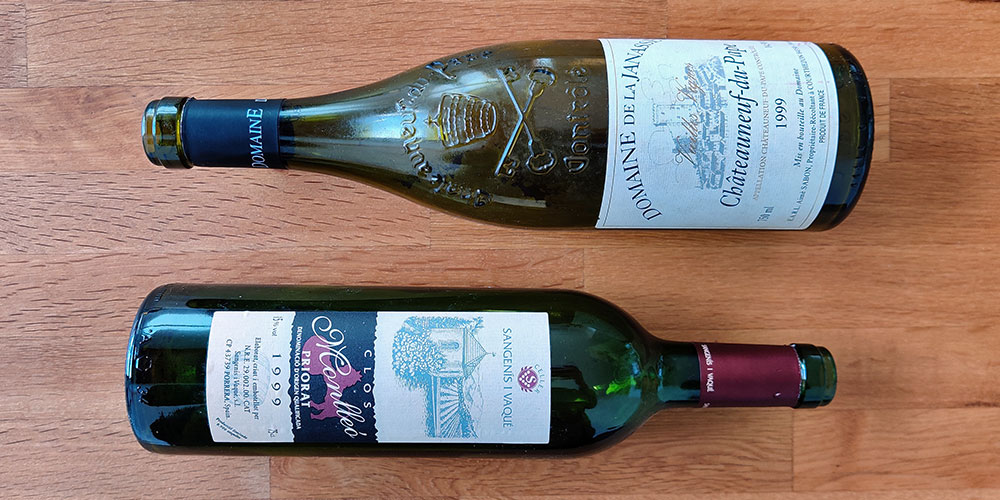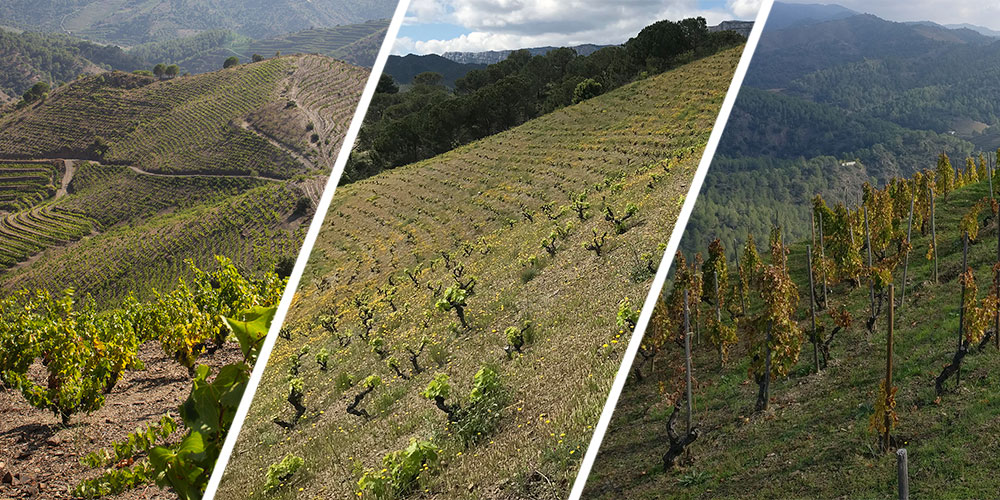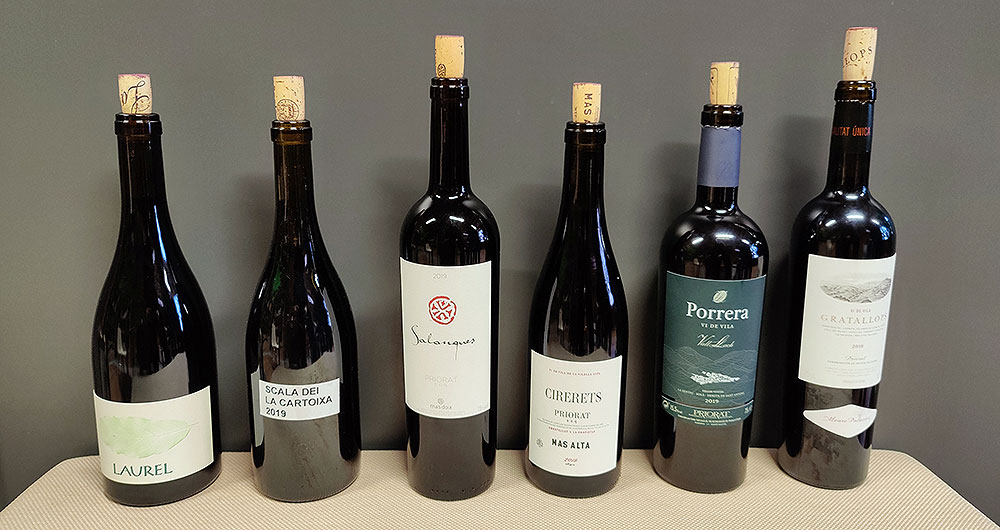At the end of last week I was having a meal with friends in the Priorat village of Porrera at La Cooperativa. The friends in question happened to be Albert and Roger of Vall Llach and Maria of Sangenís i Vaqué–good friends to have and naturally we were joined by Ana and Joaquim, the owners of Cal Compte in the next village over. All people knowledgeable about the region and its wines. After running through two whites to start, we switched to reds and Albert asked Litus, the co-owner of La Cooperativa with his wine Mia, to bring out the red blind to have us guess what it was.
Upon tasting it we all knew it was a Priorat wine, so no mystery there. But of course which village, cellar, and year was the real question. I was convinced that it was from a southern village cellar and a more recent year, maybe one of the mid range wines from Gran Clos or Mas d’en Gil. Others had their opinions which were all over the map and when it was finally revealed in the end, it ended up being the 2006 Salanques from Mas Doix in the more northern village of Poboleda. Why were we all completely wrong? It was mainly for the simple fact that Litus chose a vintage that was hotter than usual and thus the wine took on characteristics of the hotter villages down south. The fact it was eight years old also helped to reduce the level of minerality in the wine which is also less pronounced in the southern villages. This was just to say that anyone who goes around spouting that they remember every vintage and can tell you exactly what a wine is when tasting blind are generally full of shit. This group of winemakers who know every vintage for the last decade, a hotelier who has done the same, and a wine writer (me) who has tasted all 350 different wines in Priorat (including multiple vintages) were all stumped.
To mix it up, Litus pulled out another bottle which upon pouring one member of the group said, “I think it’s corked” and I replied, “No, I think it’s just French” which Litus laughed and confirmed. That one threw everyone for a loop as they’re more accustomed to their regional wines. I managed to guess that it was a Rhône wine and the 2010 vintage. This was by sheer luck as in the last few months I’ve been focused on tasting a lot of these wines from 2010 to 2012. Had it been another year, I would have been completely out of luck. I had no idea as to the cellar nor to the fact it was a far northern Rhône, so I’m not nearly as awesome as I may seem, just lucky.
This little story was for the purposes of talking about the sommelier or as I shudder to write it but many love to say, the “somm” [I hate this as Americans love to heavily en-dumbinate French words like “maître d'” which has been subject-ectomied]. Punch has published several good articles on the American Somm as well as making the case for certification as well as against.
By most American definitions, I am a sommelier. By most European definitions, I am not. This rather huge division in what was originally meant to be a certification of someone to know what they’re talking about in regards to liquids we imbibe (it’s not just wine and no, there is no such thing as a “beer sommelier”) gets people fired up. I am generally one of them as not having certification for the task, but a decade’s worth of experience instead means that I can’t get hired in a restaurant nor invited to many events in Spain. Thankfully most see me as a “wine writer” and I’m allowed a peek behind the velvet curtain–generally.
In the US, it’s a free for all. There are great swaths of bearded, tattooed guys (and ladies although minus the beards) who woke up one day, decided that because they liked to drink alcohol and that they were somehow qualified to work as someone to advise people on it. It’s similar to acting wherein just being hot in the US gets you in the door whereas in England, if you haven’t studied the craft well the door, watch out for it as it likes to hit people on their way out. This aspect of the sommelier is annoying as it creates the general idea that there isn’t much to it and anyone can do it if they look the part.
My general take is that I’m not fully a fan of either school of thought. The need for rigid certifications can be overcome by a great wealth of experience whereas on the other hand a little bit of schooling for a newcomer can go a long way to shedding the asshole sommeliers who are just hellbent on forcing you to drink funky Muscat or questionable natural wines. The key aspect is curiosity and never stopping to learn about wine or spirits or the other elements of discipline.
I’ve know several dingbats here in Spain who received their certifications and seemed to think, “That’s it, I’m a sommelier, hear me pour!” Their tasting notes are terrible and they know nothing about the greater world of wine than what they studied. Those people in the world of wine that I respect and who are both with and without certification are always tasting and always learning about wine. Every year is something new and you need to keep up with it. This problem is no better illustrated than in the movie aptly titled, Somm which chronicles a group of guys studying for the Master Sommelier certification which looks far too grueling for my tastes and the fact that I’m much happier spending a week up in Côtes du Rhône learning about a small chunk of French wine than trying to cram all the known information about the world of wine in to my head for one exam. But it’s a good look for the curious about what it takes to really, really intensely study to be a “top” sommelier, not that I’m advocating for that in the least. Sometimes there’s just too much to enjoy drinking.




